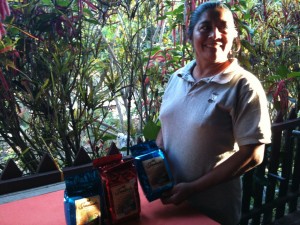“Everything on an organic farm should smell good,” says farmer Enrique Mario Peréz as he shows us barrels of his homemade liquid additives. “Except this one,” he says, lifting another lid. “This one smells like the devil.” The aroma of the thick, chile-laced insect repellent is distinctive, to say the least, but more like a well-aged cheese than the acrid odor of a traditional chemical concoction. In this sense, it does smell good, because it smells like something natural.
 Joselinda Peréz showcases her own coffee brand, which is grown, harvested, processed by hand, and roasted on her organic farm in Honduras.
Joselinda Peréz showcases her own coffee brand, which is grown, harvested, processed by hand, and roasted on her organic farm in Honduras.
Mario has kind eyes, a fashionable white mustache, and an irrepressible love of the science and art of organic coffee farming. His wife, Joselinda, applies the same dedication to her role as the family’s entrepreneur, roasting and selling the coffee from their farm as a local brand. On their porch, she shows us the hand-cranked, charcoal-powered coffee roaster they use to prepare their beans. “Todo es manual!” she says. When someone wonders how they can maintain an even roast with such a machine, Joselinda brings us the beans–uniformly colored and richly fragrant. Then we follow her into the kitchen to grind the beans by hand and prepare coffee with water from a kettle heating on a wood-burning oven.
Mario soon enters and shows us another of his special brews–a fermented beverage prepared from hygienic compost. We throw back shots of the effervescent, tea-like drink. It’s surprisingly good–no hint of the diabolic here–and yet another example of Mario and Joselinda’s far-reaching abilities. Their special blend of family, business, and environment is a concoction that the whole supply chain can benefit from.
This post was written by Jacen Greene, Development and Finance Analyst



.png)
